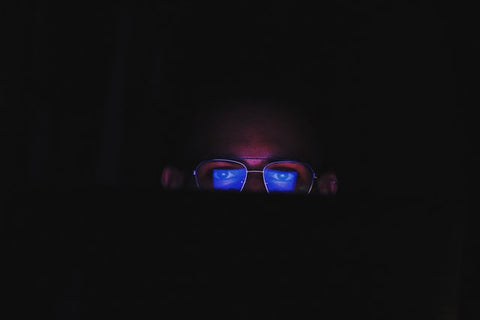Almost 50 percent of older adults suffer from insomnia.
It’s no surprise, then, that the use of melatonin supplements known to induce sleep has quintupled since the late 1990s.
But is melatonin all it’s hyped up to be? As melatonin use rises, so do safety concerns.
Like most dietary supplements in the United States, melatonin is not regulated by the Food and Drug Administration (FDA).
So what risks are associated with its use? Is it worth it to try melatonin, or is it dangerous to use over time?
Before we take a closer look at the specifics, let’s talk more about what melatonin is and why it’s commonly used as a sleep solution.
Melatonin: The Sleep Hormone
Melatonin is a hormone naturally produced in the brain that helps you regulate your sleep-wake cycle, also known as your circadian rhythm.
This is your body’s built-in clock that runs on a 24-hour cycle, telling you when to wind down and sleep and when to wake up.

Around two hours before your normal bedtime, your body begins to gradually produce melatonin, causing that familiar drowsy sensation.
Your body continues to produce melatonin throughout the night, peaking at its highest concentration while you’re asleep. When sunrise approaches, melatonin drops, helping you begin to feel awake and alert.
However, melatonin production is interrupted if you’re exposed to bright or blue light, like light from a phone screen.

For this reason, many people may experience slowed or blocked melatonin release, making it harder to fall asleep.
Since melatonin is naturally occurring in the body, many people assume it’s completely safe to buy melatonin and supplement it if your production is off.
This sentiment is factual: taking melatonin is mostly harmless, as long as it’s only taken for a short period of time in small doses.
For example, melatonin is usually effective for jet lag or brief insomnia when taken in dosages that range from 0.1 mg to 5 mg, but is not useful for long-term sleep disorders.
It’s also been used to treat anxiety disorders, but more research is needed.
Does Melatonin Treat Anxiety or Cause It?
The argument that melatonin is an effective form of anxiety treatment mainly relies on one 2017 study that found that melatonin boosted levels of gamma-aminobutyric acid (GABA) in rats.
Higher GABA levels are known to calm the brain and lower anxiety.
However, the majority of research detailing the effect of melatonin on anxiety in humans has been done on subjects who are about to undergo surgery.

Many people experience anxiety before surgical procedures, and melatonin has been studied in comparison to benzodiazepines as a method to reduce anxious feelings before surgery.
Findings showed that melatonin worked better than a placebo pill and just as well as midazolam, a commonly used benzodiazepine, to reduce anxiety before a procedure.
An additional study found that melatonin worked as well as alprazolam, another commonly used medication, to lower symptoms of anxiety before surgery.
It isn’t clear whether or not melatonin and anxiety are linked in terms of social anxiety, panic attacks, or generalized anxiety disorder.
In fact, melatonin is also suspected to cause anxiety, especially if used for other reasons outside of pre-surgical anxiety reduction. Put simply, melatonin anxiety is real.
It’s even been linked to nightmares, rendering its common use as a sleep aid even less successful.
Are “Melatonin Nightmares” Real?
Some people have complained that melatonin causes them to have intense, vivid dreams. You may have even experienced it yourself after taking the supplement before bed, especially in higher doses.
Melatonin nightmares are no joke, and science supports the idea that taking melatonin could cause you to have more of them.

While you sleep, your brain cycles through multiple sleep stages, from light sleep to deeper sleep, to our deepest sleep phase, called rapid eye movement (REM) sleep.
Bad dreams are distressing, so the idea that melatonin can cause nightmares seems counterproductive.
Nonetheless, melatonin increases the amount of time you spend in REM sleep. This stage of sleep is where you do most of your dreaming.
The science behind melatonin nightmares is based on the fact that the supplement is functioning as intended; by mimicking natural melatonin the brain would normally produce to help you spend more time asleep.
@somnifix Does #melatonin cause #nightmares? 🌙 research suggests it might! #didyouknow #factorcap #learnontiktok #sleep #health ♬ Aesthetic - Tollan Kim
As you spend more time asleep, the possibility of experiencing melatonin nightmares during deep sleep phases rises.
Yet another “nightmare” associated with melatonin supplementation? Migraines.
Can Melatonin Treat Migraines, or Does it Cause Them?
Some claim to take melatonin for migraine treatment, while others report that taking melatonin triggers headaches.
Research shows that certain doses of melatonin are successful at treating pre-existing headaches. That said, it shouldn’t be the first thing you reach for to relieve the aching pain in your head.
Whether you have a full-blown migraine or a dull tension headache, they’re nothing to ignore.

Migraines are thought to be caused by abnormal brain activity that alters nerve signals within the brain, something disrupting our vision.
If you’re experiencing headaches or migraines regularly, visit your healthcare provider or neurologist to rule out a more serious condition that could be causing your throbbing pain.
Moreover, the very thing thought to treat headaches could be causing them, as researchers are still unsure of exactly how melatonin and head pain relate.
The risks associated with taking an unregulated supplement like melatonin don’t end with headaches, though. The following side effects are also associated with its use, especially at high dosages.
Dangers of a High Dosage
Some people grab the first brand of melatonin they see with little to no concern for the dosage amount.
Too much melatonin will not only make it even harder to sleep than usual due to a disrupted circadian rhythm; it can cause some serious side effects like:
- Nausea
- Diarrhea
- Joint Pain
- Anxiety
- Irritability
- Dizziness
Moreover, high doses of melatonin are even known to affect blood pressure.
If you’re already taking a medication to lower your blood pressure such as a beta-blocker, your natural melatonin production may dwindle in comparison to before.
That said, taking a melatonin supplement to make up the difference may not be the best solution, as it can raise your blood pressure if you’re taking a pre-existing medication to lower it.

Your dosage amount may need to be adjusted based on your age and tolerance, but dosages vary wildly by brand. Some may contain as much as 60 mg per pill!
To avoid harmful symptoms and ensure that melatonin will actually help you sleep rather than causing a myriad of other problems, try to keep your dosage between 0.1 and 5 mg.
No matter the dosage or your reason for trying it, remember that taking melatonin isn’t a long-term solution. Changing your sleep habits is.
The Alternative? Change Your Sleep Habits
A small amount of melatonin taken an hour or two before you turn in for the night may help to correct temporary problems with your sleep-wake cycle.
For example, if you’ve traveled across time zones and are experiencing jet lag, melatonin can help correct your circadian rhythm and put you back on track to a normal schedule.
While short-term use of melatonin isn’t inherently harmful, long-term use is known to cause the irritating side effects we’ve discussed above, like frequent nightmares.
That’s why it’s so important to address the root cause of your sleep issues rather than masking them.

Rule out a sleep disorder like sleep apnea, which can be deadly if left untreated.
This condition causes disordered breathing during sleep, leading to lapses in breathing as you sleep. This fragments your rest, leaving you groggy and tired the next morning.
If you are found to have a sleep apnea diagnosis, your physician will likely prescribe continuous positive airway pressure (CPAP) treatment.
However, even if you don’t have sleep apnea, open-mouth breathing is known to cause snoring. This keeps both you and your sleeping partner from sleeping as deeply as you should.
Mouth taping offers a solution that can help both improve CPAP therapy for those with sleep apnea and prevent snoring for those who don’t, allowing you to finally get that sweet uninterrupted, deep sleep you’ve been craving.
Mouth Taping Over Melatonin
If you’re concerned about the risks of taking high doses of melatonin or you feel that your melatonin supplement just isn’t helping you anymore, try swapping out your nightly dose for mouth tape.
Mouth breathing leads to snoring, as it causes your airway tissues to fall backward and obstruct your breath. As a result, you’ll snore (and you may even snore yourself awake).
Over time, obstructed breathing leads to sleep apnea and activates our fight or flight response, keeping the body in a stressed state rather than a restful one.

Your poor sleep structure could be fixed with just a little bit of tape. Mouth tape, that is. Mouth tape forces you to breathe through your nose, allowing for restorative, snore-free sleep.
Moreover, nasal breathing activates the parasympathetic nervous system, which helps us restore and repair the body.
Nitric oxide produced during nasal breathing is even known to improve oxygenation and boost immunity.
The adhesives in most tapes are known to irritate the skin, so reach for a skin-safe option like SomniFix.

Our Mouth Strips are free from harmful chemicals, latex, and gluten. Our strips are also hypoallergenic, meaning they’re the perfect solution for any skin type.
When you enter the world of mouth taping, you’ll quickly experience all of the health benefits it has to offer, like improved sleep and reduced cavities. Furthermore, you won’t have to buy melatonin or deal with pesky side effects from its use anymore!
Say goodnight to melatonin anxiety, nightmares, headaches, and interrupted sleep for good with the help of SomniFix!



